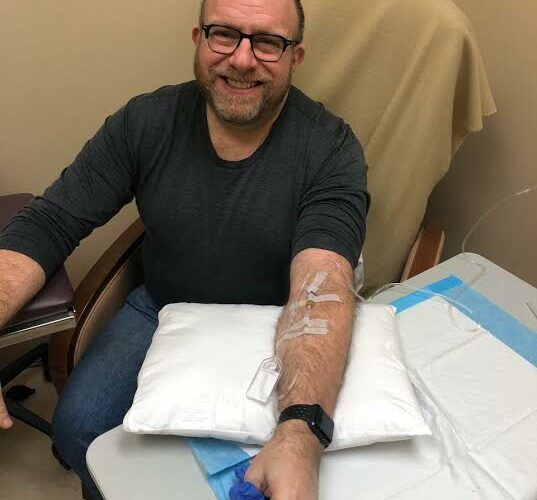Almost a year ago, the phones and social media feeds of about 4,000 people around the world began to explode. Biogen had unexpectedly—and quite abruptly—cancelled the phase 3 clinical trials of a highly anticipated Alzheimer’s drug, and the shock waves rippled throughout the Alzheimer’s community.
For those of us who had been enrolled in the trial, some of us for almost three years, the news came as a crushing blow made worse by the impersonal way we heard about the news from the media.
In a widely reported statement, Michel Vounatsos, Biogen’s chief executive, said the company was “incredibly grateful to all of the Alzheimer’s disease patients, their families and the investigators who participated in the trials.”
But the bottom line, Biogen and its research partner Eisai said, was that an independent review of data determined that the drug was unlikely to help Alzheimer’s patients when compared to a placebo. The drug had failed what is called a “futility test,” Biogen said, and therefore the trials were cancelled. End of story.
Biogen didn’t send that statement to trial participants. And because the news broke early in the morning, our doctors and other investigators who worked with us were still likely in bed or on their way to their offices when the news broke.
In an essay for The New York Times, I described learning of the news as being punched in the stomach. My good friend Jeff Borghoff told Being Patient that he learned about the trial’s cancellation from a good friend (who just happened to be me).
“I was sitting in front of my laptop and a dear friend of mine contacted me who was also in the clinical trial. He said to me, ‘Hey buddy, did you hear the bad news?’” Borghoff said. “Immediately I just had this sinking feeling that he was going to tell me that the aducanumab trial had been cancelled.”
In addition to grieving the loss of aducanumab, many people enrolled in the trial were angry about how they learned the news. It really did not seem fair to hear life-altering news in such a depersonalized fashion.
And it wasn’t only the trial participants who were devastated. There were scores of doctors and researchers who had also pinned their hopes on aducanumab.
Among them were Dr. Emily Largent and Dr. Jason Karlawish of the University of Pennsylvania who took to the pages of JAMA Neurology earlier this month to talk about the obligations owed to drug trial participants.
Titled “Rescuing Research Participants After Alzheimer Trials Stop Early,” the editorial concluded that “respect for persons requires that we treat participants and their study partners in ways that acknowledge identity and promote dignity throughout trials but also when they end.”
The researchers propose that publicly-held drug companies, which are obligated under law to release “material” information to those who hold financial interests in the company, should send information to trial participants at the same time they release the news to the media.
Under this scenario, participants would be warned in advance that trials could end abruptly and then, if a plug is pulled, they would get an email or text at the same moment the news was released to reporters and financial analysts.
In an interview, Largent agreed that this is still not a great way to get such personal news.
“Ideally everyone would get a phone call from the research team that they have a personal relationship with,” she said. “But that’s not practical.”
“Our idea is not a perfect solution,” she added, “but it is a pragmatic solution.”
Asked how confident she is that something will change, Largent described herself as “incredibly hopeful.”
While nothing has yet come of it, the National Institute on Aging (NIA) is trying to organize companies to figure out how to more humanely notify participants in Alzheimer’s trials, Largent said.
“A lot of people are saying we need to figure out a better way,” she said. “And based on the sheer amount of attention this has received, we’re hopeful.”
Biogen responded to the JAMA editorial by saying that because of the need to maintain patient confidentiality and data integrity, it is unable to communicate directly to patients in its studies.
However, the company noted that within hours of the March announcement, it held a conference call with sites that were conducting phase 3 studies and quickly provided a letter for the sites to share with trial participants.
“We recognize the deep contribution study participants make to advance research and drug development, and we wanted to express our sincere appreciation to participants, their families and loved ones,” Biogen spokesman David Caouette said.
The tortured story of aducanumab has, of course, continued. Late last year, Biogen reversed itself and said that data received after the decision to kill the Alzheimer’s trials showed that aducanumab was indeed succeeding in slowing the progression of the disease.
The company is expected to soon ask the U.S. Food and Drug Administration (FDA) to approve the drug. In the meantime, they will begin a re-dosing study for the participants who had been enrolled in the past clinical trials. Stay tuned to Being Patient for ongoing coverage of aducanumab.
Phil Gutis is a former New York Times reporter and current Being Patient contributor who was diagnosed with early onset Alzheimer’s. This article is part of his Phil’s Journal series, chronicling his experience living with Alzheimer’s.





